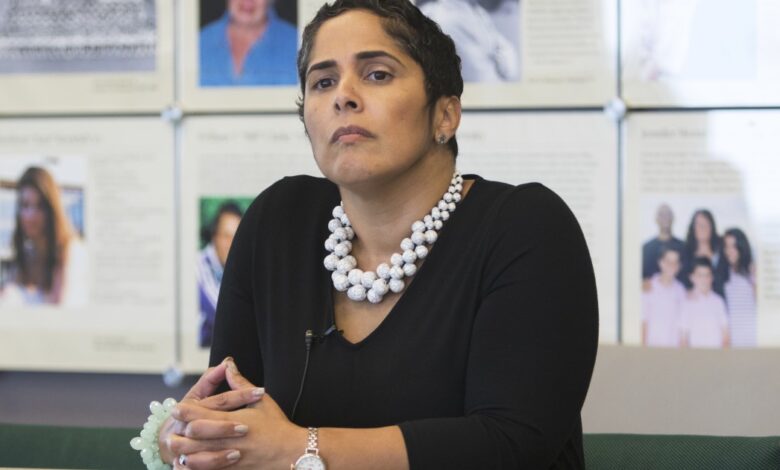This College President Led Pandemic-Era Cuts. Now She’s Moving On.

Shirley M. Collado, who became Ithaca College’s president amid student protests over racism and led the private New York institution during a messy period of pandemic-era financial turmoil, announced on Thursday she would resign.
Collado, one of the few Latina women to serve as a college president, will step aside at the end of August, but she plans to stay on through December as a “senior adviser” to the interim president and the Board of Trustees.
In January she will become president and chief executive officer of College Track, a nonprofit that aims to help underrepresented students get through college. Her four-year tenure at Ithaca is the shortest presidency in its 129-year history.
Higher-ed experts have speculated that the stress of leading through the pandemic would hasten the departures of college presidents. By the end of 2020, that exodus hadn’t yet happened. There were reasons that presidents wouldn’t leave right away — to preserve continuity in the midst of a crisis, for example, and to project strength across their institutions. Over time, though, experts said more turnover could occur.
Collado didn’t cite the pandemic as the reason for her exit. But there’s no question that she was under pressure in the past year — and before. As president, she had to deal with declining enrollment and layoffs as well as issues of race, gender, and sexual misconduct.
Collado told The Chronicle in an interview that she had planned to stay at Ithaca for several more years, but that the opportunity to lead College Track — which aligns with her commitment to access, equity, and serving first-generation and low-income students — was too good to pass up. Leaving was her choice, not the college’s, she said: “My board has been unwavering in their commitment to me.”
She earned about $534,000 as Ithaca’s president in 2018, according to the latest data available in The Chronicle’s salary survey. It’s not clear how much she will earn in her new position; her predecessor there was paid $253,000 in 2018-19, according to federal tax filings.
Big Cuts
Covid-19 aside, Collado said she knew at the outset of her presidency that the college’s size and financial model, which relied almost entirely on tuition revenue, needed to be “recalibrated.” The “demographic cliff” in the Northeast was looming, and Ithaca’s faculty was too large for the smaller student body of the future.
Collado led the creation of a strategic plan that she said was devised collaboratively with students, faculty members, and staff members. Last fall, after the pandemic caused a grim 15-percent enrollment decline, Collado said the college had to speed up the process of making cuts.
“If you’re going to be bold and realistic, and align your resources with your values, you’ve got to make tough decisions,” she said. “You don’t make a strategic plan that’s just going to collect dust.”
In October, La Jerne Terry Cornish, the provost, announced at a virtual faculty meeting that nearly one-fourth of the college’s 547 full-time faculty positions were on the chopping block.
Many professors and students questioned whether such drastic measures were really necessary. They wondered how Collado had even come up with her goal for the future size of Ithaca College: 5,000 students, down from 6,700 students in 2015. Some on campus felt that Collado and other senior administrators had never fully explained their decisions.
“Through shared governance, we could have figured out a creative way to keep everyone on the ship as we navigated these treacherous waters,” said Sandra Steingraber, who left Ithaca in May after 18 years as a scholar in residence.
Steingraber’s job wasn’t eliminated, but she didn’t see a path forward for her work at Ithaca College, given that many of her colleagues had been laid off — an outcome that continues to upset her. She’s now a senior scientist at the Science and Environmental Health Network.
In faculty meetings over the past year, Steingraber said, some professors predicted that Collado would make the cuts and then leave right away. It’s a common phenomenon in the corporate world, Steingraber said: “Someone is hired to oversee the bloodbath, and then they get to jump ship. Meanwhile, people’s lives are wrecked in the wake of it all.”
Collado said she and other leaders had been transparent and had taken into consideration varied perspectives across the institution. She said she wouldn’t have done anything differently. “There are a lot of realities in our sector that are difficult to grapple with, but you have to name them and talk about them openly,” she said.
Dan Breen, an associate professor of English who leads Ithaca’s chapter of the American Association of University Professors, said the governance problems that have plagued the college over the past year are bigger than any one administrator.
“I hope that the Ithaca College community will use this time of transition to consider ways in which the voices of all campus constituencies can be fully included in decision making,” Breen wrote in an email.
Criticism With an Undertone
When Collado arrived at Ithaca, in 2017, the college was reeling from protests by students of color who said they had felt unwelcome at the predominantly white institution. Student activists were outraged about several race-related campus incidents and demanded that the sitting president, Thomas R. Rochon, resign. Rochon stepped aside in the summer of 2017.
The arrival of Collado, a vocal supporter of marginalized students and advocate of combating inequity, seemed to many on campus like a major step forward.
Her first year in office was marred by the public revelation of a sexual-abuse charge against her from 2001. Collado, then an early-career psychologist, pleaded no contest to one charge of placing a hand on the clothed breast of one of her patients. Collado and Ithaca’s board have said they discussed the issue before she was hired. Collado has denied all wrongdoing, and said she had made the plea because she didn’t have the money for a court fight.
On Thursday, she said: “I’m not going to comment on this, because I’ve commented on it multiple times. I have been completely open about my entire, full life, well before I became president of Ithaca College.”
As president, Collado said she had put racial equity at the center of decision making. She aimed to make the college a national model for diversity and inclusion. In 2018 she tapped Cornish, a longtime Goucher College professor and administrator and a Black woman, to serve as provost. It’s rare to have two women of color leading a college.
As anger over faculty cuts swelled last academic year, Collado and Cornish said they believed that some of the criticism of their leadership had racialized and gendered undertones.
Asked whether she felt her departure was an example of the “glass cliff” — the phenomenon, described by researchers, in which women and people of color are tapped to lead through crises, when there’s a high chance of failure — Collado said that the glass cliff was “very real” in general but “not unique to Ithaca.”
In Collado’s departure, Belisa González said she clearly saw the influence of race. “Quite honestly, it’s a very familiar story to me,” said González, an associate professor of sociology and director of Ithaca’s Center for the Study of Culture, Race, and Ethnicity. Collado, she said, was yet another woman of color in academe facing outsize criticism and disrespect, as Nikole Hannah-Jones did at the University of North Carolina at Chapel Hill. And González didn’t blame Collado, like Hannah-Jones, for wanting to go elsewhere.
In González’s view, Collado unfairly took the heat for decisions that had to be made, given the financial upheaval caused by the pandemic.
Some at Ithaca have criticized Collado and Cornish as outsiders who reshaped the college without meaningfully consulting longtime faculty and staff members. Steingraber, the former scholar in residence, said calling the women “outsiders” was racist. But she still felt it was important to hold them accountable for what she believed were harmful decisions.
Cornish, the provost, will serve as Ithaca’s interim president for the 2021-22 academic year, according to a statement from the Board of Trustees. The board will take that time “to thoughtfully consider and evaluate the best approach” for hiring a new president, the statement said.
Collado said she wasn’t yet sure whether she would seek another college presidency. She said she was focused on leading College Track, which she characterized as “a long-term decision.” She didn’t see her resignation as a departure from higher ed. She just planned to push for change from a different vantage point.
Source link






